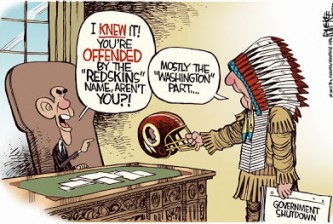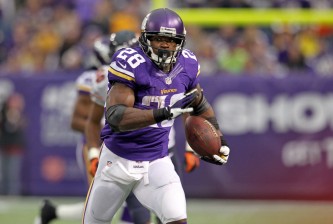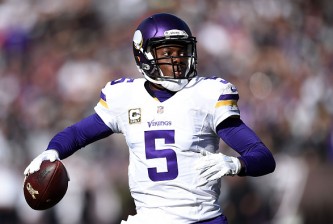
The Detroit Lions took a massive leap forward as a team in 2011, returning to the playoffs for the first time since 1999, as Matt Stafford threw for over 5,000 yards and Calvin Johnson led the league in receiving yards en route to being an almost-unanimous All-Pro selection. Their stay in the playoffs would prove short-lived, though, as the New Orleans Saints moved the ball virtually at will. The Saints did that on the heels of Week 17’s game against the Green Bay Packers, when a Matt Flynn-led offense did the same. If the Lions are to be a serious Super Bowl contender, they’ll need to avoid those defensive disasters in the future. What do they have to do to avoid them, and what role might Ndamukong Suh and Nick Fairley play going forward?
The first question Lions general manager Martin Mayhew and head coach Jim Schwartz have to answer is, how good exactly was their defense in 2011? Was it as bad as it looked those final two games, when they gave up 45 points both games, the Packers rolled up 469 yards passing and 550 yards total offense and the Saints 459 yards passing and 626 yards total offense?
The answer, somewhat surprisingly, seems to be that it was better than you think, and a lot better than the final two games would indicate. The question is how this self-evaluation will lead this team’s approach to the offseason.
True, the Lions ranked 22nd-best by pass yards allowed, but passing yards are often a function of game situation. With the Lions’ high-powered offense, teams threw the ball frequently against the Lions-they faced the fifth-most pass attempts in the league. When teams did drop back to pass, they weren’t very efficient. My favorite stat for that is Adjusted Net Yards per Pass Attempt, or ANYPA, which takes into account sacks, touchdowns, and interceptions. By ANYPA, the Lions were actually the seventh-best defense in the league during the regular season.
The Lions probably weren’t quite that good as that number indicates. They intercepted at an above-average rate, which is typically more luck than skill and prone to reversion the next year. The Lions also aren’t so good at run defense. They faced fewer attempts, but teams were successful when they did so, and averaged 5.0 yards per carry, third-worst in the NFL. The Lions were especially prone to giving up long runs, but the defensive line as a whole was a problem.
One of the culprits came as a bit of a surprise. 2010’s second-overall pick Ndamukong Suh made a huge impact as a rookie, with 10 sacks and a big and disruptive impact on running plays. 2011 was a disappointing sophomore campaign for him, with only 4.0 sacks and about 60% as many plays in the run game. Teams seemed to learn to use his quickness against him, letting him burst upfield and running where he should have been and avoiding where he was.
Suh’s lessened impact in the pass and run game was certainly not the result of the play of first-round defensive tackle Nick Fairley. It looked like the Lions had a steal of a pick when the former Auburn star fell to them, but a training camp left foot injury delayed his debut and limited his impact in the ten games he did play. The Lions will assuredly be looking for a lot more than 15 tackles and 1.0 sack from him next year.
Beyond hoping for better seasons from Suh and Fairley, the Lions probably won’t make any serious changes at the position. The big questions are elsewhere on the defensive side of the ball:
-
Defensive end Cliff Avril. The fourth-year player had a breakout season with 11.0 sacks, but he’s heading to free agency. Right now he has visions of a contract like the one Charles Johnson received from the Panthers, for 6 years and $72 million. He’s a likely franchise tag candidate, but has already expressed his intent to skip offseason activities and possibly hold out if the Lions do slap him with the tag. A long-term deal seems unlikely, as the Lions may think he’s the next Ray Edwards-a left defensive end whose production is more the result of the defensive tackles and right defensive end than his own skills. Do the Lions tag him anyway and let him express his wrath how he will?
-
Cornerback. Is a duo of Chris Houston and Eric Wright good enough, or do the Lions look for a top end cornerback? The obvious candidate is Cortland Finnegan, who played for Schwartz with the Tennessee Titans. Finnegan can play outside or in the slot and is a very good, but not elite, cornerback. He’s also probably looking for a contract at least as big as the 5 year, $48.75 million deal Johnathan Joseph signed with the Texans. Will the Lions meet his asking price?
-
Middle linebacker. Stephen Tulloch, another former Titan, joined the Lions on a one-year deal and was very active at middle linebacker, leading all Lions defenders in plays. Unfortunately, he’s also prone to biting on play action and unreliable covering the intermediate and deep areas of the field. The Saints had success exploiting him in the playoffs. Do the Lions make a financial commitment to him, hoping he’ll be better in coverage, or rely on DeAndre Levy and a healthy season from Justin Durant?
-
Safety. Louis Delmas is no longer the brightest star in the Lions’ defensive firmament, with the addition of brighter stars and lack of a step forward from good to elite. Is Delmas and Amari Spievey the long-term answer at safety? Spievey in particular certainly does not seem like it. Schwartz, who preferred right and left safeties in Tennessee rather than the traditional strong and free, could go to the Titans well again and add Michael Grififn, who looked like an ascending star when Schwartz was with Tennessee and more like a schlub after Schwartz left. Still, he’s only 27 and has the physical skills to be an elite safety. If Schwartz can get his head in the right place and keep it there, he could be a star again.
The Lions’ ability to maintain or even improve on 2011’s overall defensive results, and their ability to avoid busts like the ones that plagued them against the Packers and Saints, will depend on how well they answer those questions. Finding the right answers probably yields a serious Super Bowl contender. Not finding the right answers almost certainly will not.
{loadposition content1}






















